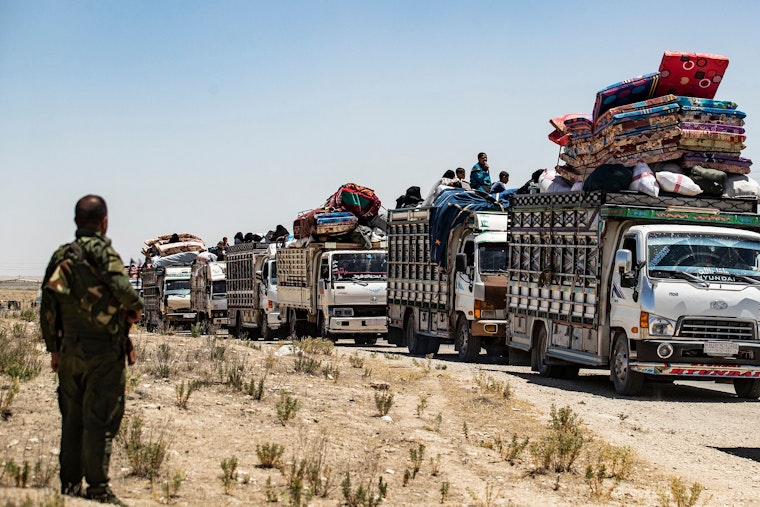Why Hundreds of European Children Living in Syrian Camps Must Be Repatriated
By Georgiana Epure & Duru Yavan

In March 2019, the Syrian Democratic Forces (SDF) ousted ISIS from the last of the territory it had seized in Syria and Iraq. Since then, SDF has indefinitely detained an estimated 64,000 women and children in the al-Hol and al-Roj camps in northeast Syria without charge, for their alleged links to ISIS.
The conditions in the camps are inhumane and even life-threatening, particularly for children. The camps are overcrowded and under-resourced, with severe lack of water, food, electricity, and sanitation facilities. In mid-June, an 11-year-old girl collapsed from malnutrition in the al-Roj camp and had to be rushed to medical attention, and hundreds of other children have died of preventable diseases. Children are exposed to physical, psychological, and sexual violence in the camps, as well as exploitation, trafficking, harassment, and indoctrination into ISIS ideology.
Among the 45,000 foreign nationals held in the camps, approximately one thousand are European, out of which more than half are children—mostly under the age of five. All countries hold a responsibility to protect their child nationals and there have been numerous, repeated calls from European and international human rights bodies, as well as SDF, for states to repatriate their child nationals from the camps. European states, however, have overwhelmingly refused to do so.
Under national, European, and international human rights law, children are entitled to special protection and states have a legal obligation to ensure that the child’s best interests are a primary consideration when handling situations that affect them. Given the squalid conditions in the camps in northeast Syria, continued detention in the camps is not in the best interest of a child by any standard of the law.
Limited repatriations have occurred on a case-by-case basis, targeting children who are very young or with acute medical needs, who are mostly orphans or otherwise unaccompanied and with a proven nationality. This approach, based on unclear and nontransparent criteria, is not only against the best interests of the child, prolonging the precarious situation of children in the camps, but it also creates an ambiguous and unfair hierarchy of children who “deserve” to be repatriated and those who do not. While there have been some recent positive changes in some European countries’ repatriation policies, reluctance to repatriate the children together with their primary caregivers and piecemeal approaches to repatriations prevail.
European states’ resistance to repatriating these children does not add up. There are no legal barriers to their return—on the contrary states actually have a legal obligation to protect these children—and the repatriations that did take place prove that they are logistically feasible, especially given the cooperation of the SDF authorities. The barriers are instead largely political in nature, embedded in a long history of structurally racist and Islamophobic politics.
While European countries have often hidden behind security arguments, many actors, including national security professionals, have underscored that leaving children and women in the camps does not serve states’ long-term security interests. Instead they have called for their repatriation, which enables a controlled and monitored process of return that continues with rehabilitation, reintegration, and, as warranted, prosecution.
In the absence of states’ action, family members of the children and women in the camps have taken their governments’ failure to repatriate to court. Some cases in Germany, Belgium, France, and Finland have been adjudicated, or are currently being litigated before domestic courts, the European Court of Human Rights, and the UN Committee on the Rights of the Child.
Legal practitioners who have attempted or plan to intervene to defend these children can look to the Open Society Justice Initiative’s legal briefing paper to help advance creative approaches to this urgent and seemingly intractable problem. The legal arguments covered in the briefing paper start with the best interests of the child and the extraterritorial application of human rights, and continue with the right to be free from discrimination, the right to nationality, the right to access consular assistance, the right to enter one’s own country, the right to life, the right to be free from torture and ill-treatment, the right to liberty and security, the right of child victims of armed conflict to reintegration and recovery, and the right to family life and family unity, which involves repatriating the children together with their primary caregivers.
After more than two years of turning a blind eye to the dire situation of children in the camps in northeast Syria, it’s time European states fulfilled their responsibilities and repatriated them with their primary caregivers.
Georgiana Epure is an Aryeh Neier Fellow with the Open Society Justice Initiative.
Duru Yavan is an Aryeh Neier Fellow with the Open Society Justice Initiative.
